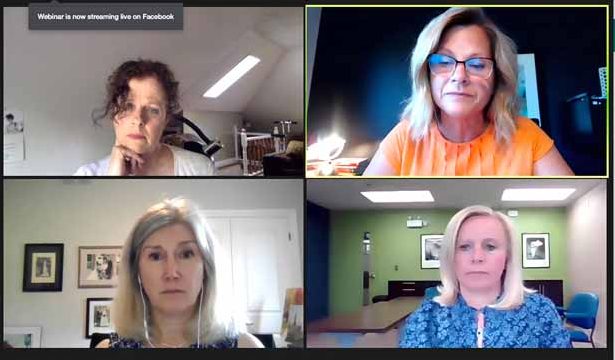GUELPH – Vaccination against COVID-19 is both a shining light and a looming fear for the public, a panel of health experts heard at a public forum on June 1.
Local family doctor and AIDS specialist Dr. Anne-Marie Zajdlik and executive director of the Canadian Mental Health Association Waterloo Wellington branch Helen Fishburn have been holding monthly public Zoom sessions since the pandemic began last year to help people wade through the fear and uncertainty, ask questions and receive factual responses.
On June 1 their guest was medical officer of health for Wellington-Dufferin-Guelph Public Health Dr. Nicola Mercer, and together they fielded questions about the different vaccines and who should get them, and the fear and anxiety that’s overwhelming many people.
First the vaccines.
The Pfizer vaccine has been approved for youth aged 12 and up and Mercer said Moderna was expected to be approved for this age group this month as well.
She said studies are underway for children aged six months to 11 years and the preliminary evidence is good. Getting children vaccinated over the summer will be an important step in reopening schools in September.
She recommended the website kidshealthfirst.ca as a credible source for information about COVID-19 and the vaccines as they relate to children. The website was created by the Children’s Vaccine Advisory Table, the group of health experts advising the government.
Regarding a question about the vaccine causing infertility, Mercer said it’s not true.
“There is no evidence that the vaccine causes infertility,” she said.
Zajdlik said there is almost no difference between the Pfizer and Moderna vaccines.
“They use the same technology, have the same efficacy and the same low rate of side effects,” Zajdlik said, to the point they are interchangeable.
Mercer said AstraZeneca shipments will be distributed to pharmacies and family doctors “and there will be a second dose for people who had AstraZeneca.
“But you can now have a second dose of Moderna or Pfizer. You have a choice.”
Mercer encouraged everyone to register for their first dose if they haven’t already. She said public health will be administering mainly first dose shots in June and second dose shots in July and August.
She said the first dose acts as a “prime” and affords good protection against the virus.
“The reason for the second dose is protection against the variants,” she said, especially the variants that originated in India and South Africa that are extremely contagious and have worse health symptoms and outcomes.
Fishburn took the mental health questions and they centred around fear – fear of getting COVID, fear of getting the vaccine, fear of mixing with people again and worry about not mixing with people right now.
“It’s going to take a while to overcome our fears,” Fishburn said. “Some will adjust quickly and can’t wait for reopening. Others are stuck in that place of anxiety.
“We have to separate fact from fear,” she continued. “Name your fears, talk about them. It’s okay to be fearful. But find reliable information and let the information guide your decisions.”
Fishburn said cognitive behavour therapy can help change the way a person thinks and feels, especially if one becomes locked in negative patterns of behaviour.
She said journaling, meditation and talking to a sympathetic ear can be helpful, “but if you’re not sleeping or eating, that can impact your relationships. That’s when it’s time to reach out and talk to a professional.”
The group came up with a word-of-the-month type game. In April the word was “pangry,” meaning anger at the pandemic. In May is was “languishing,” meaning you’re doing okay but not moving forward.
This month the word is “coronaphobia,” Fishburn said.
“This is when people are excessively fearful of getting COVID and re-engaging with the world. Some people are terrified,” she said.
“There’s a lot of good news out there – vaccinations are going up and cases are going down.
“But mental health is not a light switch. It will take time to work through,” she said. “Give yourself permission not to feel great. Slowly and carefully, we’ll readjust.
“And if you need help, it’s there.”
The Here24/7 distress line is 1-844-437-3247.




